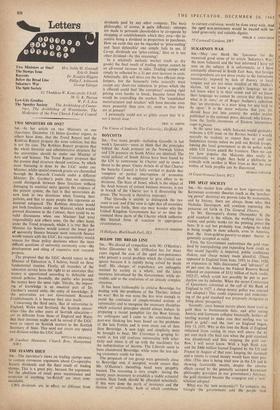Two Ministers or One? Mrs. Stella M. Greenall The Stamps
Issue Eric 0. Smith Boycotts Dr. Rosalyn Higgins Below the Bread Line Philip J. Ashworth Sukarno's War George Edinger
The Split Society Lt. Thaddeus W. Kopczynski, USAF, M. G. K. Pierson
Low-Life Goodies W. F. S. Joss The Spastics Society The Archbishop of Canter-
bury, The Archbishop of Westminster, The Moderator of the Free Church Federal Council TWO MINISTERS OR ONE?
SIR, In her article on two Ministers or one (Spectator, December 13) Helen Gardner argues, as others have done, that the Trend Report and the Robbins Report propose the same solution; but this is not the case. The Robbins Report proposes that the whole financial and administrative structure for the universities should be under one Minister of Arts and Science. The Trend Report proposes that the present dual structure should continue, by which most financing is done by the UGC under one Minister, whilst special research grants are channelled through the Research Councils under a different' Minister. Dr. Gardner's point that no university could distinguish between these functipns without damaging its essential unity ignores the evidence of the present system; the fact is that universities do now look in two directions when framing their policies, and that to many people this represents an essential safeguard. The Robbins structure would put both functions under one Minister, which would prevent discussion in the Cabinet; there could be no valid discussions when one Minister had total responsibility and others none. On the other hand, under the Trend proposals, whilst it is trite that.the Minister for Science would control the lesser part of university finance because most research finance would remain with the UGC, his responsibility would remain for those policy decisions where the most difficult questions of university autonomy arise—the development and siting of expensive new research projects.
The proposal that the UGC should report to the Minister of Education is, I believe, based on three fundamental reasons. Firstly, all branches of the education service have the right to an assurance that money is apportioned according to definable and related policies. Secondly, the public who provide the money have the same right. Thirdly, the impart- ing of knowledge is an essential part of Dr. Gardner's second unity, the unity of knowledge; if the universities are not Government Research Establishments it is because they also teach.
Concerning the third unity, that of universities in England, Wales and Scotland, the Scottish univer- sities—like the other parts of Scottish education— arc so different from those of England and Wales that their interests might well be served if the UGC were to report on Scottish matters to the Scottish Secretary of State. This need not create any special new division within the UGC itself.
STELLA M. GREENALL 20 Gardnor Mansions, Church Row, Hampstead, NW 3






























 Previous page
Previous page